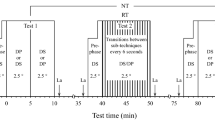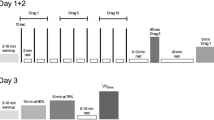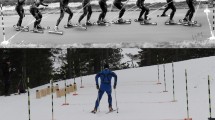Abstract
Appropriate technique choice may affect ski performance. V2 ski skating technique has in recent years become more widely applied on uphill terrain where V1 technique has typically been used. This investigation compared physiological responses of skiers using V1 and V2 techniques during uphill treadmill roller-skiing. Part 1: six skiers from B-level national ski teams participated in technique comparisons performed under six uphill conditions (3, 4, 5, 6, 7, and 8°) with speeds selected so external work was approximately constant for each slope. The 12 trials of 5-min steady-state skating were randomly distributed across two test sessions of six trials each. Heart rate (HR), oxygen consumption (VO2), blood lactate concentration (La) and rating of perceived exertion (RPE) were measured. Part 2: 15 skiers from A-level and B-level national ski teams participated in V1–V2 technique comparison on constant slope (5°) with five speeds ranging from 2.25 to 3.25 m s−1 . In two test sessions of V1 or V2 skating (randomly assigned for 2 days) similar characteristics as Part 1 were measured. Across all variables consistent responses were observed for both the experimental parts. As slope increased, V2 skating became increasingly costly compared to V1 skating. At constant slope across the range of speeds, V2 was more costly than V1 skating. This suggests that it may be disadvantageous for skiers to use V2 instead of V1 skating technique on moderate to steep uphill terrain. Doing so may result in elevated HR, La, and VO2 compared to V1 skating at the same speed.


Similar content being viewed by others
References
Åstrand PO, Rodahl K (1986) Textbook of work physiology. Physiological bases of exercise. McGraw-Hill, New York, pp 43–53, 188–208
Bilodeau B, Roy B, Boulay MR (1991) A comparison of three skating techniques and the diagonal stride on heart rate responses and speed in cross-country skiing. Int J Sports Med 12:71–76
Borg GAV (1970) Perceived exertion as an indicator of somatic stress. Scan J Rehab Med 2:92–98
Boulay MR, Rundell KW, King DL (1994) Effect of slope variation and skating technique on velocity in cross-country skiing. Med Sci Sports Exerc 27:281–287
Colbeck SC (1994) A review of the friction of snow skis. J Sports Sci 12:285–295
Conley DL, Krahenbuhl GS (1980) Running economy and distance running performance of highly trained athletes. Med Sci Sports Exerc 12:357–360
Costill DL, Kovaleski J, Porter D, Kirwan J, Fielding R, King D (1985) Energy expenditure during front crawl swimming: predicting success in middle-distance events. Int J Sports Med 6:266–270
Coyle EF, Feltner ME, Kautz SA, Hamilton MT, Montain SJ, Baylor AM, Abraham LD, Petrek GW (1991) Physiological and biomechanical factors associated with elite endurance cycling performance. Med Sci Sports Exerc 23:93–107
Gaesser GA, Brooks GA (1975) Muscular efficiency during steady-rate exercise: effects of speed and work rate. J Appl Physiol 38:1132–1139
Hoffman MD, Clifford PS, Snyder AC, O‘Hagan KP, Mittelstadt SW, Roberts MM, Drummond HA, Gaskill SE (1998) Physiological effects of technique and rolling resistance in uphill roller skiing. Med Sci Sports Exerc 30:311–317
Hoffmann MD, Clifford PS (1990) Physiological responses to different cross country skiing techniques on level terrain. Med Sci Sports Exerc 22:841–848
Hoffmann MD, Clifford PS, Foley PJ, Brice GA (1990) Physiological responses to different roller skiing techniques. Med Sci Sports Exerc 22:391–396
Hoffmann MD, Clifford PS, Watts PB, Drobish KM, Gibbons TP, Newbury VS, Sulentic JE, Mittelstadt SW, O‘Hagan KP (1994) Physiological comparison of uphill roller skiing: diagonal stride versus double pole. Med Sci Sports Exerc 26:1284–1289
Hoffmann MD, Clifford PS, Bender F (1995) Effect of velocity on cycle rate and length for three roller skiing techniques. J Appl Biomech 11:257–266
Jones N, Ehrsam R (1982) In: Terjung R (ed) The anaerobic threshold. Exerc Sport Sci Rev 10:49–83
Karlsson J, Jacobs I (1982) Onset of blood lactage accumulation during muscular exercise as a threshold concept. I. Theoretical considerations. Int J Sports Med 3:190–201
Karvonen J, Kubica R, Kalli S, Wilk B, Krasicki S (1987) Effects of skating and diagonal techniques on skiing load and results in cross-country skiing. J Sports Med 27:473–477
Karvonen J, Kubica R, Wilk B, Wnorowski J, Krasicki S, Kalli S (1989) Effects of skating and diagonal skiing techniques on results and some physiological variables. Can J Sports Sci 14:117–121
LaFontaine TP, Londeree BR, Spath WK (1981) The maximal steady state versus selected running events. Med Sci Sports Exerc 13:190–193
Mahood NV, Kenefick RW, Kertzer R, Quinn TJ (2001) Physiological determinants of cross-country ski racing performance. Med Sci Sports Exerc 33:1379–1384
Margaria R, Cerretelli P, Aghemo P, Sassi G (1963) Energy cost of running. J Appl Physiol 18:367–370
Millet GY, Hoffman MD, Candau RB, Buckwalter JB, Clifford PS (1998a) Cycle rate variations in roller ski skating: effects on oxygen uptake and poling forces. Int J Sports Med 19:521–525
Millet GY, Hoffman MD, Candau RB, Clifford PS (1998b) Poling forces during roller skiing: effects of technique and speed. Med Sci Sports Exerc 30:1645–1653
Millet GY, Perrey S, Candau R, Rouillon JD (2002) Relationships between aerobic energy cost, performance and kinematic parameters in roller ski skating. Int J Sports Med 23:191–195
Millet GP, Boissiere D, Candau R (2003) Energy cost of different skating techniques in cross-country skiing. J Sports Sci 21:3–11
Mittelstadt SW, Hoffman MD, Watts PB, O‘Hagan KP, Sulentic JE, Drobish KM, Gibbons TP, Newbury VS, Clifford PS (1995) Lactate response to uphill roller skiing: diagonal stride versus double pole techniques. Med Sci Sports Exerc 27:1563–1568
Miura H, Kitagawa K, Ishiko T (1997) Economy during a simulated laboratory test triathlon is highly related to Olympic distance triathlon. Int J Sports Med 18:276–280
Mognoni P, Rossi G, Gastaldelli F, Canclini A, Cotelli F (2001) Heart rate profiles and energy cost of locomotion during cross-country skiing races. Eur J Appl Physiol 85:62–67
Mygind E, Andersen LB, Rasmussen B (1994) Blood lactate and respiratory variables in elite cross-country skiing at racing speeds. Scand J Med Sci Sports 4:243–251
Nilsson J, Tveit P, Eikrehagen O (2004) Effects of speed on temporal patterns in classical style and freestyle cross-country skiing. Sports Biomech 3:85–107
Perrey S, Millet GY, Candau R, Rouillon JD (1998) Strech-shortening cycle in roller ski skating: effects of technique. Int J Sports Med 19:513–520
Powers SK, Beadle RE, Mangum M (1984) Exercise efficiency during arm ergometry: effects of speed and work rate. J Appl Physiol 56:495–499
Rundell KW (1995) Treadmill roller ski test predicts biathlon roller ski race results of elite U.S. biathlon women. Med Sci Sports Exerc 27:1677–1685
Saibene F, Cortili G, Roi G, Colombini A (1989) The energy cost of level cross-country skiing and the effect of the friction of the ski. Eur J Appl Physiol 58:791–795
Smith GA (1989) The effect of velocity and grade on the kinematics and kinetics of V1 skating in cross country skiing. Unpublished doctoral dissertation, The Pennsylvania State University, University Park
Smith GA (2003) Biomechanics of cross country skiing. In: Rusko H (ed) Cross country skiing. Blackwell, London, pp 32–61
Author information
Authors and Affiliations
Corresponding author
Rights and permissions
About this article
Cite this article
Kvamme, B., Jakobsen, V., Hetland, S. et al. Ski skating technique and physiological responses across slopes and speeds. Eur J Appl Physiol 95, 205–212 (2005). https://doi.org/10.1007/s00421-005-1332-5
Received:
Accepted:
Published:
Issue Date:
DOI: https://doi.org/10.1007/s00421-005-1332-5




